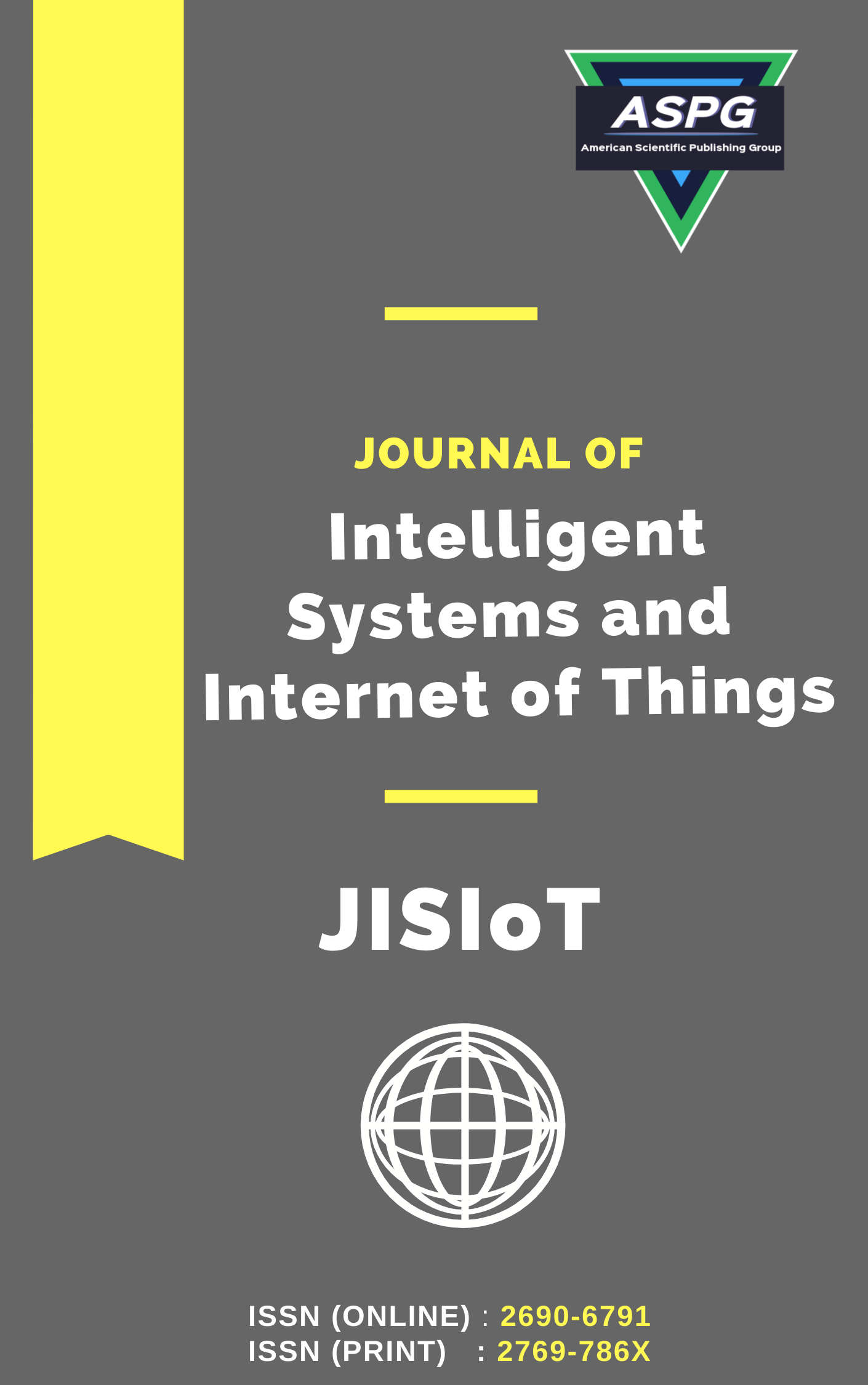

Volume 10 , Issue 2 , PP: 08-17, 2023 | Cite this article as | XML | Html | PDF | Full Length Article
Dionisio Ponce Ruiz 1 * , Rita Azucena D. Vasquez 2 , Bolivar Villalta Jadan 3
Doi: https://doi.org/10.54216/JISIoT.100201
As energy efficiency and sustainability become paramount in the face of growing urbanization and environmental concerns, predictive energy management in smart buildings has emerged as a promising avenue for mitigating energy consumption and optimizing resource utilization. In this paper, we investigate the application of advanced machine learning techniques, particularly a multi-layer Long Short-Term Memory (LSTM) model, within the framework of the Internet of Things (IoT), to predict and manage energy consumption. We rigorously evaluate our approach against a suite of machine learning baselines, including Linear Regression, Random Forest, Support Vector Machine, and Gradient Boosting, utilizing a comprehensive dataset encompassing power consumption data from smart home appliances and associated weather variables. Our experimental results demonstrate the superior predictive capabilities of the LSTM model, showcasing its ability to outperform traditional machine learning baselines across various metrics, including Mean Absolute Error (MAE), and Root Mean Squared Error (RMSE). These findings underscore the potential of deep learning models in capturing intricate temporal dependencies within energy consumption data, contributing to improved energy efficiency, cost savings, and environmental sustainability in smart building environments. The integration of predictive energy management models into IoT-enabled smart buildings holds the promise of a more intelligent and sustainable future in urban development and resource management.
Internet of Things (IoT) , Smart Buildings, Energy Efficiency , Predictive Energy Management , Sensor Networks , Data Analytics , Smart Grid , , Building Automation and Control Systems (BACS).
[1] Shah, Syed Faisal Abbas, Muhammad Iqbal, Zeeshan Aziz, Toqir A. Rana, Adnan Khalid, Yu-N. Cheah, and Muhammad Arif. "The role of machine learning and the internet of things in smart buildings for energy efficiency." Applied Sciences 12, no. 15 (2022): 7882.
[2] Bedi, Guneet, Ganesh Kumar Venayagamoorthy, and Rajendra Singh. "Development of an IoT-driven building environment for prediction of electric energy consumption." IEEE Internet of Things Journal 7, no. 6 (2020): 4912-4921.
[3] Xiaoyi, Zhang, Wang Dongling, Zhang Yuming, Karthik Bala Manokaran, and A. Benny Antony. "IoT driven framework based efficient green energy management in smart cities using multi-objective distributed dispatching algorithm." Environmental Impact Assessment Review 88 (2021): 106567.
[4] M. Muthuswamy, A. M. Ali, and A. Abdelhafeez, “Breaking the Silence: Convolutional Neural Networks for Sign Language Recognition in the Deaf Community”, SMIJ, vol. 1, Oct. 2022. https://doi.org/10.61185/SMIJ.2022.7844
[5] Nivetha Martin, Said Broumi, S.Sudha, R.Priya, Neutrosophic MARCOS in Decision Making on Smart Manufacturing System, Neutrosophic syst. appl., vol.4, (2023): pp. 12–32.
[6] Yu, Liang, Shuqi Qin, Meng Zhang, Chao Shen, Tao Jiang, and Xiaohong Guan. "A review of deep reinforcement learning for smart building energy management." IEEE Internet of Things Journal 8, no. 15 (2021): 12046-12063.
[7] Mousavi, SeyedehNiloufar, María Guadalupe Villarreal Marroquín, Mostafa Hajiaghaei-Keshteli, and Neale R. Smith. "Data-driven prediction and optimization toward net-zero and positive-energy buildings: A systematic review." Building and Environment (2023): 110578.
[8] Sayed, Aya, Yassine Himeur, Faycal Bensaali, and Abbes Amira. "Artificial intelligence with IoT for energy efficiency in buildings." Emerging Real-World Applications of Internet of Things (2022): 233-252.
[9] Apanavičienė, Rasa, and Mustafa Muthnna Najm Shahrabani. "Key Factors Affecting Smart Building Integration into Smart City: Technological Aspects." Smart Cities 6, no. 4 (2023): 1832-1857.
[10] Lu, Chujie, Sihui Li, and Zhengjun Lu. "Building energy prediction using artificial neural networks: A literature survey." Energy and Buildings 262 (2022): 111718.
[11] Sadeeq, Mohammed AM, and Subhi Zeebaree. "Energy management for internet of things via distributed systems." Journal of Applied Science and Technology Trends 2, no. 02 (2021): 59-71.
[12] Perumal, Thinagaran. "Making buildings smarter and energy-efficient—using the Internet of Things platform." IEEE Consumer Electronics Magazine 10, no. 3 (2021): 34-41.
[13] CAMPODONICO AVENDANO, ITALO ALDO. "Development of IoT-driven Machine Learning based pipelines for predictive modelling of ramp-up and ramp-down processes in indoor environments aiming at energy efficiency enhancement." (2022).
[14] Al-Qarafi, A., Hadeel Alsolai, Jaber S. Alzahrani, Noha Negm, Lubna A. Alharbi, Mesfer Al Duhayyim, Heba Mohsen, M. Al-Shabi, and Fahd N. Al-Wesabi. "Artificial jellyfish optimization with deep-learning-driven decision support system for energy management in smart cities." Applied Sciences 12, no. 15 (2022): 7457.
[15] Lv, Zhihan, and Wenlong Shang. "Impacts of intelligent transportation systems on energy conservation and emission reduction of transport systems: A comprehensive review." Green Technologies and Sustainability (2022): 100002.
[16] Mazhar, Tehseen, Hafiz Muhammad Irfan, Inayatul Haq, Inam Ullah, Madiha Ashraf, Tamara Al Shloul, Yazeed Yasin Ghadi, Imran, and Dalia H. Elkamchouchi. "Analysis of Challenges and Solutions of IoT in Smart Grids Using AI and Machine Learning Techniques: A Review." Electronics 12, no. 1 (2023): 242.
[17] Martinez, M. A. Q., González, G. A. L., Rios, M. D. G., & Vazquez, M. Y. L. (2021). Selection of LPWAN technology for the adoption and efficient use of the IoT in the rural areas of the province of Guayas USING AHP method. In Advances in Artificial Intelligence, Software and Systems Engineering: Proceedings of the AHFE 2020 Virtual Conferences on Software and Systems Engineering, and Artificial Intelligence and Social Computing, July 16-20, 2020, USA (pp. 497-503). Springer International Publishing.
[18] Vazquez, M. Y. L., Arteaga, B. S. M., López, J. A. M., & Martinez, M. A. Q. (2020). Design of an IOT architecture in medical environments for the treatment of hypertensive patients. Revista Ibérica de Sistemas e Tecnologias de Informação, (E33), 188-200.
[19] Llerena, D., Delgado, R., Ubilluz, C., & López, R. (2020, October). A prototype proposal for detection and reduction of stress by using Brain waves and IoT. In 2020 International Conference of Digital Transformation and Innovation Technology (Incodtrin) (pp. 12-16). IEEE.
[20] M. A. Zambrano, J. M. Espinosa, and J. L. Villa, "Energy management system for smart buildings integrating demand response and predictive control," IEEE Transactions on Smart Grid, vol. 10, no. 3, pp. 2735-2745, May 2019.